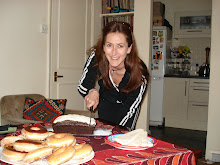
Is if it was not enough to ensure one is constantly learning another language, ( don't get me wrong, I love stimulating the language learning part of my brain ) Brittany puts a whole new slant on the language as it has in fact, rather than dialect a whole different patois/lingo of it's own. Occitane in the Languedoc I had just got my grey matter tuned into, sounds like....Ving Blang for Vin blanc, Du Pang for pain, Demang for demain etc and a few other Occitan expressions I learned along the way. Not all printable!
Up north there are completely new words to learn. Though the the Bretons of course speak the general French we know, one can feel positively more local with the use of the Breton version. Breizh" in the Breton language. On one of our house hunts when stopping to ask directions, we were spoken to in Breton, totally lost then! Here is some info..........
It is a Celtic language related to Welsh, Cornish, Manx and Scottish and Irish Gaelic. The Breton people are close cousins of the Welsh and Cornish, having emigrated to Brittany from Britain during the 4th through 7th centuries.
Breton is spoken in Lower Brittany, roughly to the west of a line linking Plouha and La Roche-Bernard (east of Vannes). Roche Bernard is about an hour from where we are located. It comes from a Celtic language community between Great Britain and Armorica (present-day Brittany), and even Galicia. It was the language of the elite until the 12th century. However, afterwards it was only the language of the people of West Brittany (Breizh Izel), and the nobility, then successively the bourgeoisie, adopted French. As a written language, the Duchy of Brittany used Latin, switching to French in the 15th century.
Today, Breton is still spoken as an everyday language by about 200,000 people. At the beginning of the 20th century, half the population of Lower Brittany knew only Breton, the other half being bilingual. By 1950, there were only 100,000 monolingual Bretons, with even fewer nowadays. Breton is now considered to be an endangered language.
In 1977, schools were founded to teach Breton by immersion. They taught a few thousand young people from elementary school to high school and they are still attended today.
Today, Breton is the only living Celtic language which is not recognised as an official language.
I will keep you 'posted' as to how I get on but perhaps will not be writing a whole post in Breton for a while yet!




3 comments:
The only thing you really need to know is how to say "cheers" - trust me, les Bretons will love you for it! The spelling differs depending on the area (Dermat, Irmat, etc), but the pronunciation is the same "Yam mat" (with the a's being pronounced the same as the a in 'caw').
I took a beginning Breton class in Vannes one year, it was pretty interesting and made for a good conversation starter.
That is interesting Ksam. Maybe I'll take a class in Breton myself when time permits.
Thanks Ksam, most useful info. Thanks for taking the time to post this info much needed. I may head to Vannes myself for a course to gen up on the local lingo.
Irmat, Dermat,
French Brit Bird
Post a Comment